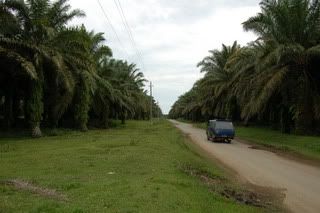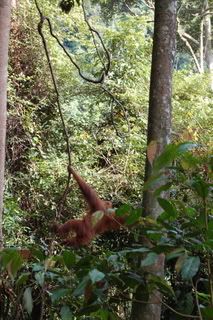"Bukit Lawang
Back in Medan we briefly rested at Panut's house where his wife prepared a delicious breakfast of rice and a fish soup. Soon we were in the back of another mud sprayed 4x4, the air-conditioning struggling in the fast rising temperature as midday approached.
Out of the bustling city the condition of the roads worsened, tarmac appeared intermittently but soon gave way to treacherous mud tracks. As we bounced further out into rural areas an odd monotony began to take over the scenery. Gradual at first it became apparent that the jungle either side of the track was oddly symmetrical. Uniform lines of large Palm trees loomed over us disappearing far off into the horizon, neatly standing to attention like columns of some vast temple. The ground beneath scrub or fern covered. We were passing through the Palm plantations.
Our four-hour journey saw no break in the plantations, occasionally rubber trees would peer out, each equipped with small taps but we’d soon return to the Palms spreading their large fronds out, covering the level canopy. Palm Oil is found in the kernels of the Palm fruits and a hectare of mature plants can produce approximately 4 tonnes of oil a year. Around 36 million tonnes of oil are sold each year and 5 million tonnes of this comes to European soil where the UK is the biggest consumer. Labelled vaguely as vegetable oil 1 in 10 products on UK supermarkets shelves contain it.
Even with these huge figures only 2% of the Indonesian work force is employed by the Palm plantations and the social responsibility of these companies is questionable. The roads we so painfully progressed along were in such disrepair due to the increasing convoys of palm laden lorries making their way to the city where the value of the exported oil will be realised thousands of miles away. Meanwhile locals line the roads in small houses while migrating Javan workers work the plantations. Currently 90% of the world’s palm oil originates from the plantations in Sumatra and Borneo of which there is now 6.5 million hectares. With Palm Oil being earmarked as the best option for bio fuels in the future demand is set to rise at an incalculable rate. The price of this development is that now there stands nearly 4 times more cultivated palm than natural forest in Sumatra. As the forest makes way for the plantations, we are losing its species and biodiversity with it.

As we reach the border between national conservation jungle and palm plantations the difference is remarkable. The jungle reaches out up into the hills densely packed with rich green trees and shrubs, concealing fruit and wildlife.
The area used to be a bustling holiday resort, many hotels and amenities lined the fast flowing river fed by mystical waterfalls cascading from the lush vegetation. Then three years ago a flash flood hit the area late at night sweeping 150 customers and locals to their deaths and with it electricity supply, sanitation systems and many of the buildings. Some of the locals say it was punishment for the debauchery and corruption that had started to establish itself here with prostitution, drinking and gambling. Now slowly rebuilding itself the community are perched high up the hill in makeshift housing. We make our way to the ‘Jungle Inn’ for the night.
Recently built the Jungle Inn has bags of character. The rooms are unique, perhaps a little too unique for Alan who, already complaining of feeling ill, asks to swap room with me due to his aversion to an amphibious companion in his. As I watch the frog harmless hop away in to one of the dark corners of the room I set my bag on the large double bed. What I hadn’t told Alan was that having spent ten minutes in what was now his room, I had heard an incessant chattering of a group of macaques making it quite clear that it was there territory and I was content to share with a frog rather have listen to that all night.
Sitting in the open restaurant the gentle sound of the river gurgling by and the smell of aromatic Indonesian cooking wafted over us. Dinner arrived and both Alan and I sweated through the local version of ‘not spicy’. Soon after we all slunk of to our respective rooms.
I’d had a fabulous nights sleep in my room with nothing but the soothing sound of the waterfall just outside my window to disturb me. Alan however, described a different night, one in which during the grips of a chillie/malaria tablet fever, unable to sleep from strange noises on his roof, he had struggled to Panut's room where he proceeded to be violently ill through out the night. Added to this, images of flash floods and the sound of the river rushing by he’d had a rather exciting evening.
After Alan’s breakfast of dry toast we crossed the river uneasily in a shallow boat more accustomed to distributing Indonesian body weight. Clambering out the other side there was a distant flash of brilliant red hair further up the bank, standing opposite us was a young female Orang-utan, her long crimped fur hanging down her arms which reached the ground from her squat shoulders. Suspecting an audience she began to lounge about gurning and coyly posing for the cameras.
As we ventured further up into the forest we came to the main feeding platform where the semi wild orang-utans congregate to steal bunches of small bananas from one another. Leisurely sweeping through the trees another came to see what was on offer, up to 15 can be seen here but the local fruit trees were in season and there was no need for the rest to visit today.
The Orang-utans have been fighting a losing battle recently, in a hurry to develop the Palm plantations locals clear their natural habitat treating the ‘men of the forest’ as pests. Burning, mutilation and forced captivity are common hazards for modern day Orang-utans. As vast swathes of their territories are replaced with unappetizing Palms, Orang-utans returning to areas once rich in fruits find themselves disorientated and if caught suffer at the hands of the locals. Projects exist both in Sumatra and Borneo for rehabilitation of Orang-utans saved from the deforestation or from captivity. However, reintroducing these animals back into forest that is only going to be felled again can be a somewhat futile task. With an estimated 7300 Sumatran Orang-utans left in the forest it could well be that in a decade they are facing extinction in the wild. As the world’s appetite for Palm oil continues to grow unabated it is these animals which will suffer.

As we made the final journey back to Medan before returning home we noticed the small fires every household had flickering away in their yards. Believed to refresh the earth and make it more fertile the tradition of burning is known as ‘cleaning’ in local tongue. Plantation owners take up this habit and dead trees and waste matter are quickly and cheaply burnt of. Unfortunately this leads to a vast heat haze carrying across much of South East Asia polluting the air and causing literally billions of dollars both in damage and in lost revenue.
Indonesian culture is one of using the forest as is seen fit. It’s their personal larder and convincing them that both Palm planting and illegal logging are prohibited is not welcome news. As is pointed out its western countries that, having already felled most of our forests to establish our economies, are now denying them the same right. Indeed if it were just Indonesia’s needs that were taken from the forests the problem would not be of the scale we see today. Unfortunately the West, India and Chinas use of Palm oil is having drastic consequences.
As our plane rose up into the blue sky the ground below faded into a rich green carpet, the bobbles of distant Palm trees covered every available surface like the ridges of a woven jumper. As I turned to show Alan I saw that jungle belly had struck him again, his seat lay empty and the ‘engaged’ sign quietly lit up the galley."
http://edgeforest.blogspot.com/search/label/Palm%20Oil
1 comment:
This style of writing reminded me very much of Bill Bryson. Very informative yet amusing!
Post a Comment